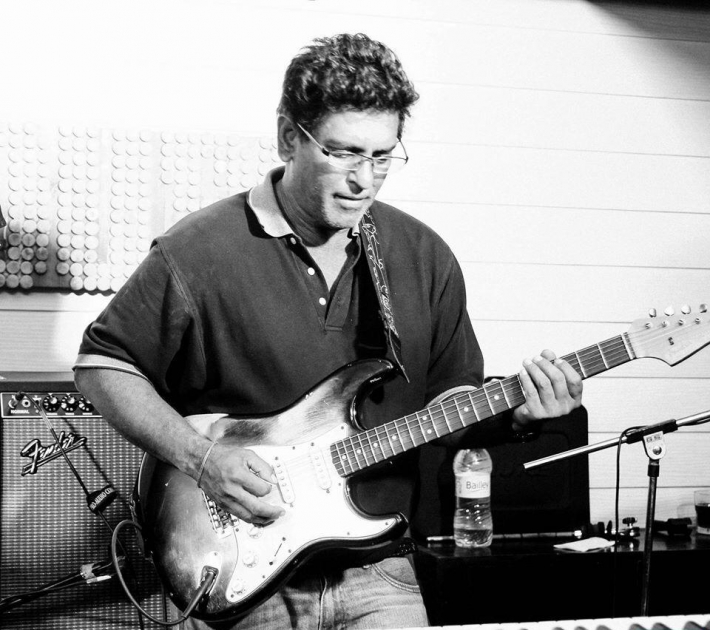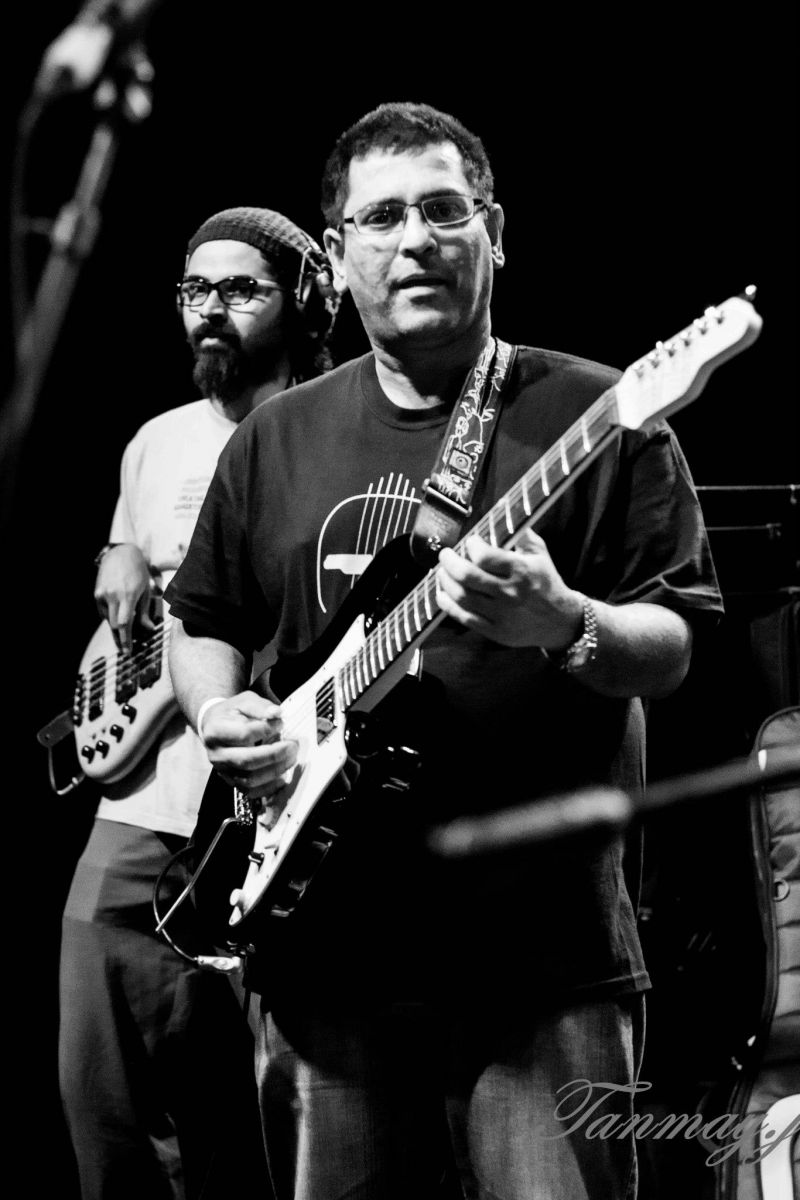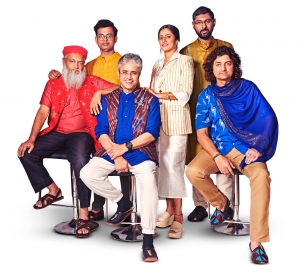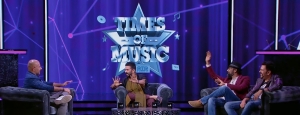
 Photo Courtesy: Nishant Jhamb | Summerhouse Cafe
Photo Courtesy: Nishant Jhamb | Summerhouse Cafe
Saibal Basu has been around the block (or it’s more accurate to say many blocks). He’s played guitar for a few decades. His credit list as a session musician is long; Neha Bhasin, Shibani Kashyap, Ranjit Barot, Loy Mendosa, Shantanu Moitra, Shubha Mudgal, Pradip Sarkar and many more. He has worked in the ad space, he’s worked as a producer, engineer and a session guitarist overseas. He’s released solo material and been in bands like Orange Street and Grey Area. He teaches and has done so for a long time (currently at BeatFactory is Delhi). If you’re thinking to yourself, “My, that’s a lot of stuff for one career”, you would be correct in that assessment. A musician like him would doubtless have tons of experience, opinions that are coloured by time and learning, a wealth of knowledge, and perhaps most importantly, an evolved view of music that comes from the wisdom of time. We spoke to him and learned that this is true.
What was the beginning of your fascination with the guitar at a young age and what made you choose it?
I started when I was eleven-twelve years old. Honestly, it just looked cool and sounded cooler than the rest. You couldn’t beat the sex appeal of the instrument, the sound; if you look at it, it’s the most organic sounding instrument. Very few instruments have the range of expression a guitar has. Sounds have also changed through time and different eras have had different meanings. My first guitar, I got a locally made acoustic from Chandni Chowk for 140 rupees… it had a high action and all that, but at that time it was all we knew, so that was what I had.
Since then, over your many years of playing, you’ve collected and used a lot of gear, different guitars and so on; are there any particular pieces of gear that you remember or were important in your journey?
Well, the thing is, with gear and stuff, I have epiphanies even today! When I was young and learning and all that, there were no guitar players around for kilometres. I got to go on holiday to London and got my first proper acoustic. Then I got a cheap local electric and a solid state amp (I had never even heard of a tube amp at the time); I would keep the amp in my room and crank it and then play in the living room, trying all sorts of new stuff by myself. I didn’t know anything. By and by, I got a Boss DS-1 and a locally made delay pedal; it was made by this guy Ranjit Sehgal who runs a shop called Minitones in Delhi. He was extremely helpful and that delay actually sounded incredible; I wish I still had it. I played in some metal bands with just these two things. It was when I went to America and stayed there for a bit that I discovered tube amps and all that. There is a non-linearity in analog gear that I like. I mean, I also own an Axe-FX, but I’m really fond of gear and have been a gear junkie. I do also talk to people like Warren (Mendonsa) and Ehsaan (Noorani) who love gear like I do.
From the start, my big discoveries have actually been finding out about what I don’t like. The thing with living in India is that you have to play some guitars which you get from abroad without seeing them first. I’ve had so many times when I’ve coveted some expensive piece; then you have no other option but to ask someone to buy it and bring it to India, and when you get it in your hands you realize it’s not for you or isn’t what you were looking for. Then you’ve to trade it or something. One of the big things we lack is the amount of access to music stores people get in the US or Europe. It also makes you realize the factors behind some people not being able to play the way they do in those regions… when I first came back from the US, I brought a tube amp and asked some young guitarists to plug into it; they couldn’t play on it! They’d never seen one before and when you play through something like that, there’s nowhere for your technique or playing to hide.

You’ve seen tons of guitarists and heard music from so many eras. Are there any new guitarists or sounds you’re drawn to?
I’m old-school. When I was young, I absolutely went through my shred phase, but my early listening was in the realm of Hendrix. These days I listen to everything except music under metal, fusion or rock. The thing about shredders and all that is that there are very few good players that play fast and well when they do. I get the feeling that a lot of the players today are more or less the same; they’re often some sort of mix of John Petrucci, Guthrie Govan, Tom Quayle and Mateus Asato or at least something of that sort. In this pandemic, I’ve started to really learn the acoustic and that has been a huge change for me. I’m listening to country and people like Keb’ Mo’, Josh Smith, Guthrie Trapp… you know, the guitar in context. Over time I’ve grown bored of the long solo that takes up half a song. I also got bored of jazz fusion and the like because after a point, it all started sounding the same. It’s like if you listen to a lot of Scott Henderson and the Tribal Tech stuff, it all starts being the same thing and you get disconnected from the instrument in a way. I do feel that a lot of people are superficial in their influences in that they’re spending time hearing but not truly listening. In my youth I was always bothered about me, when is my solo? Once you get over that, you get to something that’s hard to explain.
So when you were in the indie scene in the 90s, how did your thought process about music help you? How was the indie scene at the time, considering how completely different things are now?
I was in bands and so on, and I played my first session when I was in college; 1989-90. And I had played to a click. My first session, I had a 20-second part and I couldn’t play it. That was really humbling. In fact I still notice problems with my time where I’m rushing a bit. I then spent a lot of time in the studio, practicing to a click until I was as perfect as I could be. This actually made me difficult to play with because I would be critical of other people’s pocket and time, but I was still taking cues from people like Eddie van Halen… yes, no one can solo like him, but his rhythm playing is simply on another level. I was learning from people like Robben Ford and Larry Carlton and so on. Another thing that helped was the music I was regularly listening to in my youth; we had ABBA and Boney M and that quality. Over time, my perspective changed. Today, I find that many players do a lot for other people’s perception of their playing and not their own. I also sometimes feel a way for new musicians that pursue the guitar and are growing up around popular music that isn’t built around it.
In the 90s, yes, there were many good and bad bands just like every era and place, but one thing that was required was to work really hard and find your own voice. I had to work at it, listen and play all day. I met the Rock Machine (Indus Creed) guys in Mumbai back then, Mahesh (Tinaikar) and Jayesh (Gandhi) are dear friends. I could see how hard they worked. At the time, you also had to be really good to be in bands because everyone was doing great covers; really classic and difficult stuff. There was a lot of good inspiration to be found and there were actual concerts in Delhi at the time as well.

You teach and have been doing so for a long time; has your method changed as you have? How do you see yourself as a musician now and what would you say you have learned a student of music yourself?
Nowadays I don’t tell anyone how to hold a pick or whatever. Now I just want hear something musical from someone; I’m trying to get people to understand things like vibe and atmosphere. Listening to the right kind of music for that purpose is important. Even I am still learning, of course; for example, I only heard funk like James Brown second-hand, so to speak. My first-hand direct introduction to those sounds was from 80s pop, which I still love. From there I went to Motown and that was huge; you have three different players playing three different things and they come together in such an incredible way. There are also certain realisations or ideas that take time; everyone mentions Steve Vai’s name as a guitarist… I have seen people like Andy Timmons and Paul Gilbert absolutely crush the instrument but noticed that Vai is a great producer more than a player; coming to that place and understanding that took time for me. I greatly appreciate bands like Toto, Steely Dan, The Police… someone said Steely Dan wasn’t a band but an aesthetic; a way to represent all the musical ideas of two people. A band I love now is Khruangbin. They exemplify the whole concept of vibe that I was talking about. There’s no instrumental craziness or showboating, there’s just atmosphere.
When I look in the past, I can’t recognize my old self. I’m still trying to figure out who I am essentially. I’m still learning acoustic (which is like a whole different instrument to me) and my journey has been quite eclectic; I did grow up on good music though. Now I’m looking more for an emotion or feeling; being a producer has helped with that. I’ve always produced my playing, and some jobs I’ve done didn’t even have guitar. I now want to look at music in its exploded and essential form, and that’s something that has changed for me over time. I thought I was at a particular place but I feel very humbled every time I think so. I feel like I’m a listener more than a player now; I feel like if anyone were to ask me for advice or anything like that, I wouldn’t want to remembered as a player as much. I feel like there’s more to learn from how I’ve learnt to listen than how I play.
Previous Article Aaryan Banthia Takes It Way Back To Simpler Times Aaryan Banthia Takes It Way Back To Simpler Times
|
Next Article Interview With Wolf van Halen Interview With Wolf van Halen
|
His new single ‘Hey Betty’ has no pretensions about its ease and innocence
Sneha Khanwalkar and Indian Ocean are guests on the MXPlayer show’s eleventh episode
The tenth episode of Times Of Music features rock band Agnee and film composer Amit Trivedi



.jpg)


Leave a comment